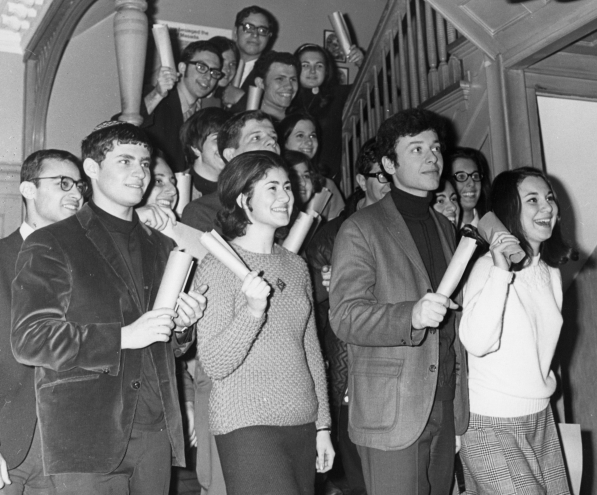Hillel
Hillel was founded in 1923 by Rabbi Benjamin Frankel at the University of Illinois. Hillel’s mandate was to foster a sense of community amongst Jewish students on campus, creating a religious, cultural and communal Jewish environment.
The Hillel Foundation of Toronto was established in 1946. During this time, over a thousand Jewish undergraduates were enrolled. B'nai Brith, served as the sponsoring organization until the 1990s, and it was financially assisted by the United Jewish Welfare Fund.
Hillel joined forces with B’nai Brith Youth Organization to raise funds for a permanent home on campus. In 1950, B’nai Brith Hillel Foundation acquired a house at 186 St. George Street and it was formally dedicated a year later. In December 1977, this Hillel House was destroyed by fire, after which its offices were moved to a space in the YMHA building at Bloor and Spadina. Programs were hosted for several years at ‘The Lower East Side’, in the Newman Centre at 89 St. George Street. In June 1979 Hillel acquired office space in a house at 604 Spadina Avenue. Hillel is now located at the Wolfond Centre for Jewish Campus Life at 36 Harbord Street, in the heart of U of T's St. George Campus. In addition to space for events and programs, the centre also features a lounge and study space for students.
Hillel at Queen’s University, established in 1941, is the oldest Hillel organization in Canada. It is the hub of Jewish social and cultural activity on campus. As of November 2013, there are official Hillel Houses in Guelph, Kitchener, Kingston, London,Ottawa and Toronto. Each House serves one or more universities or colleges in the area. Examples are Hillel Waterloo, serving University of Waterloo, Wilfred Laurier University and Conestoga College, and Hillel of Greater Toronto, the address for Jewish student life in Toronto.
In the 1970s, Hillel’s numbers across North America were in decline. In 1974 the Jewish student population at U of T was approximately 3000, but only 400 were registered members. This slump was apparently reversed by the end of the decade. Programs in the 1970s included conventions and retreats, United Jewish Appeal fundraising campaigns, a Shabbat co-op, a choir, the Coffeehouse lounge, a film series, a music club, a library society, an annual Purim Bash, an art festival, and counseling groups.
Hillel also served as the voice of Jewish students at the university. The U of T chapter participated in the fight against quotas for Jewish students and faculty, advocated for Kosher food availability on campus, and was successful in persuading the university to avoid holding examinations on Jewish holidays. In addition, Hillel often represented the views of the Jewish community to the general student population. It has been involved in the dissemination of Holocaust awareness material and in counteracting propaganda against Israel.
The 1980s saw Hillel coordinating the efforts and activities of a large number of interest groups: Student United Jewish Appeal, Toronto Student Zionists, Student Struggle for Soviet Jewry, Jewish Residence Council, Jewish Studies Course Union, Student Mobilization for Jews in Arab Lands, Moadon Aliyah, Canadian Branch of the North American Jewish Students Network, and Israeli Students.
Hillel of Greater Toronto was founded in May 1995 as a direct result of a report on Toronto campus services commissioned by UJA Federation. Zac Kaye, the Founding Executive Director was invited by UJA Federation to build and structure student life in the GTA in a unified way, and on a city-wide level. Hillel of Greater Toronto provides creative programming and events for undergraduate and graduate students at the University of Toronto, York University, Ryerson University and 'emerging campuses' such as Seneca College, Humber College, George Brown College, OCAD and the satellite campuses of York (Glendon) and U of T (University of Mississauga and University of Toronto Scarborough.
